A Murder in Queens
The narrow winding streets of Samarkand’s Jewish quarter in Uzbekistan converge on a kind of public square. For generations, householders gathered here on Friday mornings to buy fresh produce. When the Soviet Union dissolved, Jews made their emigration plans, bundled up their household items, and brought them to market. The fruit and vegetable stands were soon overshadowed by mounds of clothing, kitchen items, cradles, books, and other trinkets. The area’s bargain hunters began flocking to the market. As an anthropologist doing research in the crumbling Bukharan Jewish community, I went too.
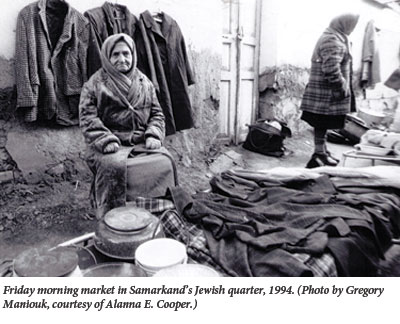
Forty-five thousand Bukharan Jews lived in Soviet Central Asia just prior to the dissolution of the Soviet Union. They may have been descendants of the Israelites exiled to Babylonia in the 6th century B.C.E. who had followed the trade routes as far as the fertile river valleys of present-day Uzbekistan and Tajikistan. “We arrived here before Islam, before the Uzbek dynasts conquered the territory,” I was told more than once. But now they were leaving. (Less than 1,000 remain there today.)
One day in 1997, I visited a family I knew at their stall. The Borukhovs told me they wouldn’t be returning. Now that the mourning period for the family’s patriarch had ended, his widow, Istat, and three of her adult children were finally headed for New York to join the two eldest daughters and their families. A few days later, I went to their home to say goodbye. I found Istat and her children sitting on boxes and bundles, speaking softly to one another. It seemed to me as if they were sitting shiva, mourning for the loss of their home, and, perhaps, mourning once again for the husband and father they were leaving behind in Samarkand’s cemetery. I stayed until the family had boarded the minivan to the airport in Tashkent. Afterwards, I remained awake for hours writing down every detail I could remember of the evening. It was (and remains) hard to find the words to describe just how heart wrenching it was to witness such a leave-taking first hand.
A few months later, I visited the Borukhov family in their small Forest Hills apartment. Istat offered me tea and cookies as though no time had passed. Luda, the youngest daughter—and the family member with whom I had been closest during my period of research in Uzbekistan—told me a bit about her English classes. Marina, or Mazoltuv, Luda’s beautiful 22-year-old sister who had studied medicine in Uzbekistan, did not speak much. The conversation lapsed into awkward silence several times, and I left not long after I had arrived, without a good sense of how they were faring. We lost touch, and I often wondered how their lives had unfolded. When I did get the news, I was dumbfounded.
Daniel Malakov was a young, good-looking orthodontist who had immigrated to the United States from Uzbekistan in 1991. On a sunny morning in the fall of 2007, he was gunned down in broad daylight on a playground in Queens, in front of Marina Borukhova, his estranged wife, and their 4-year-old daughter Michelle. The Bukharan Jewish community was shocked. “Can you believe it?” was the subject-line in a group email I received from a Bukharan Jewish friend the day after the murder.
Within days, detectives found a homemade silencer that had been taped to the murder weapon. A few weeks later, fingerprints on the duct-tape were traced to Mikhail Mallayev, a cousin of Marina’s who lived near Atlanta, and had visited New York on the day of the murder. In the three weeks before, Mallayev had spoken to Marina on the telephone 91 times. Two days after the murder, $20,000 was deposited into Mallayev’s bank account. Could Marina have done it? And if so, what could have brought this educated woman to plan the murder of her husband in broad daylight, on a playground, in front of their daughter?
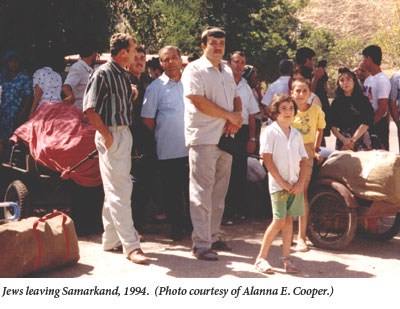
Although Marina Borukhova was convicted of first-degree murder and conspiracy, and sentenced to life in prison with no possibility of parole, Janet Malcolm does not take her guilt for granted. In her lengthy New Yorker article, “Iphigenia in Forest Hills,” and the slender book of the same name that followed a year later, Malcolm argues that what goes on in a courtroom is no more than “a contest between competing narratives.” The lawyers tell stories, the judge gives weight to some and not others, and the jury chooses. (One of Malcolm’s two epigraphs comes from a prospective juror who was not selected: “Everything is ambiguous, except in court.”)
Malcolm leaves the reader with the sense that Marina probably did orchestrate the murder in retaliation for the loss of custody of her daughter—Iphigenia is, after all, the daughter whose death Clytemnestra avenges by killing her husband Agamemnon. But one cannot be sure. And it is the haunting lack of certainty that stands at the heart of her project.
In broad strokes, here’s the story that prevailed in the courtroom: Marina and Daniel, who was also a Bukharan Jewish immigrant, married in 2001 and found themselves in a troubled relationship from the start. They separated in 2003, a few months after their daughter Michelle was born. Twice they attempted reconciliation. When they finally divorced in 2005, Marina was given custody of Michelle, but on October 3, 2007, over her increasingly frantic protestations, the court ordered that custody of the child be turned over to Daniel. Marina appealed, but the court’s decision was upheld. On October 23, Michelle was transferred to her father’s care. Five days later, he was murdered.
Integral to this version of the story is the depiction of Marina’s relationship with her cousin Mallayev. Five months before the murder, while the two were riding in a car together, they had a seemingly revealing conversation, which was recorded and read in English translation during the trial. At the end of the recording, Mallayev asks Marina, “Are you going to make me happy?” to which she replies with an unequivocal “Yes.”
After Mallayev’s fingerprints were found on the gun-silencer discovered in the park where Daniel was killed, how could there be any doubt? As the New York Times reporter put it, “The investigative crumbs seemed to align so well that it would not have even made a good TV show.”
But what about the crumbs that did not line up, the ones that fell between the cracks? Malcolm shows that the objectivity of the court’s fingerprint expert was open to question. Moreover, Mallayev may not have asked Marina, “Are you going to make me happy?” as one translator of the audiotape rendered his barely audible question, but “Are you getting off?” as another translator had it. And there were other explanations for those seemingly incriminating 91 phone calls.
If Borukhova did arrange to have her husband murdered in front of herself and her young daughter, it was almost certainly in response to her loss in the brutal custody battle in which Marina and her family alleged that Daniel had sexually abused his daughter. Malcolm argues that it was the legal system itself that helped to cause events to spin so crazily out of control.
I know of no other case where a well-cared-for child is taken from its mother because it sits on her lap during supervised visits with an absent father and refuses to “bond” with him. Yes! The whole of [Judge] Strauss’ reason for his radical ruling was his irritation with Borukhova for “prevent[ing] Michelle from bonding and further strengthening her relationship with her father” during court-ordered visits at a private agency.
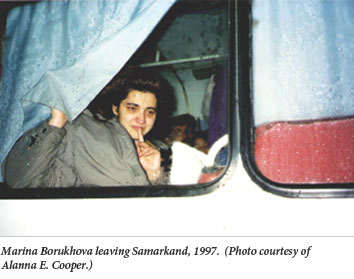
Malcolm also inveighs against David Schnall, the court-appointed guardian of Michelle Malakov, who admitted to having never exchanged a word with the child. Despite pleas from Borukhova’s lawyer, and even Malakov’s, to slow down the process, Schnall insisted that the transfer of custody take place. If Borukhova did commit the crimes for which she has been convicted, it seems that the legal system itself was to blame.
Malcolm’s riveting account left me with many questions. Thinking back to the family I met in Uzbekistan in the 1990s, I longed for more insight into their lives. In what ways were their experiences as Bukharan Jewish immigrants part of the story of this murder? And how was their community trying to come to terms with it?
Malcolm begins to touch on some of these issues in the last chapters of the book, when she and her reader take leave of the courthouse to visit the Bukharan Jewish community in Forest Hills, where Daniel and Marina Malakov had lived and worked. While standing in front of the building that had housed Daniel’s dentistry practice, Malcolm stumbles upon his father, Khaika Malakov. He recognizes Malcolm from the courthouse and brings her to his home, where she meets more family members, who in turn extend further invitations.
As Malcolm recounts her discussions with the members of Daniel’s extended family, it becomes clear that their concerns bear little connection to the issues she has so artfully developed until this point in the work. Among the Malakovs, Marina’s status as a murderer is an uncontested truth. And they don’t have any complaints about the role of child welfare in the American legal system. Daniel’s final days, when Michelle was in his care, a nephew explained, were “the happiest days of his life.” What preoccupies is the mystery of Daniel and Marina’s marriage and divorce.
Daniel’s sister-in-law Nalia remembered the sheva berakhot celebrations held in the days following their wedding: “Every night Daniel would make a speech about how he loved her and how she was the woman of his dreams.” It troubled her that he would “speak about love” saying “whatever was in his mind, without thinking about what people will say,” or whether it was “appropriate to the society.” Not long after the wedding, Nalia said, the couple showed up at a family birthday party where they again acted inappropriately. Marina “had long hair and she was dancing provocatively. She had one leg on top of his, and she would twist her head so her hair was all over him, and he’s bending her down and she’s doing all those hand movements.” This sort of dance was not the sort “you would do in front of people,” as though they were “alone in the room. As if they put a perimeter around themselves.” Daniel’s own sister Stella disagreed: “If she dances like that,” she said, it must mean that Marina “understands” Daniel, and that they were “meant for each other.”
Such disagreement and discomfort reflects the changing meanings of marriage in the Bukharan Jewish community. In Central Asia, the marriage bond was generally secondary to familial and community ties. Newlywed couples moved into the groom’s parents’ home, where the bride would bear and raise her children under her mother-in-law’s watch. Although women were given full access to education under Soviet rule and social policies were created to forge modern marriage patterns, change came slowly, for both Jews and Muslims. Arranged marriages remained common, and young couples rarely spent time with one another prior to their wedding. Indeed, the two sets of parents generally courted one another more intensely than did the future bride and groom. The wedding itself was not a celebration of love or romance, but rather the merging of two families.
The gap between this ethos and 21st-century American ideals of love and romance is, to say the least, wide. It is no surprise, then, that the advice columns of Achdut, the Bukharan Jewish monthly published in New York, are full of questions about love and marriage. (“What is the appropriate time frame for dating, maximum and minimum?” “What should a couple look for in each other so that they make the right decision?” “My in-laws are driving me crazy, what can I do?”) About the Malakov murder, however, Achdut remained largely silent. Nonetheless, a few days after the event, a reader asked “Now that the community is mourning the . . . death of Daniel Malakov . . . what words of wisdom and comfort can you provide?” In response, the columnist, a young Bukharan rabbi named Ribacoff, reframed the inquiry. According to him, “The question should be: what are we to learn from this?” And then, he said, “We should all take a better look into our married life … Ask yourself . . . is divorce always the answer?”
Several months later, Achdut reported on a lecture delivered to a youth group entitled, “Chief Rabbi’s Marital Solution: Stronger Communal Ties.” Mentioning the divorce and custody battle fought by some anonymous couple, Rabbi Yitzchak Yehoshua stressed the important role that community could have played in saving this marriage. “Had this couple stayed within the community,” he asserts, “this would not have happened.” But when a couple engages with each other on their own, as though a perimeter surrounds them, they are doomed. Turning directly to the topic of Marina and Daniel’s marriage he explains, “I tried to mediate between the couple,” but they refused guidance, “and today one of them is in a grave and another is in jail.”
Another aspect of Daniel and Marina’s relationship that perplexed his family members was the way that they brought each other meals. While Marina was doing her medical residence in Brooklyn, she occasionally called Daniel in his office, “I’m hungry, can you bring me something?” Daniel’s brother Joseph said, “He has an office full of patients. But he leaves, gets her a kosher meal, drives all the way to Brooklyn, gives her the food, comes all the way back.” Another brother remembers that “Marina would drive from Brooklyn to bring Daniel his midday meal as often as he would drive to Brooklyn to bring her hers.” “What was this about?” Malcolm asks. “What erotic ritual were Daniel and Marina enacting as they sped along the Brooklyn-Queens Expressway bearing their beloved’s kosher lunch? I would like to ask Borukhova, but I can’t.”
Neither can I. But, in thinking about it, I couldn’t help but return to my notes of the last evening that Marina spent in Samarkand. While Marina and her two siblings loaded their bundles onto the van, her mother stood by. She watched, while clutching a portrait of her deceased husband. When everything was aboard the vehicle, Marina stalled, crying, and her mother rebuked her. My journal entry reads:
“These are all my things I am leaving behind here,” Istat spoke harshly to her daughter. “You, though, will find a rich smart husband there in America. You do not cry!”
At the time, I thought that Istat must have been referring to her husband, the life they had lived together, and the home they had built. Once she boarded that bus, all she would have left of that would be the portrait she cradled in her arms. For Marina, on the other hand, a new world of opportunity stretched out before her: to marry, have a family, and create a new life. Now, I wonder if Istat was also referring to the loss of everything she knew about the nature of men, marriage, motherhood, fatherhood, family, and tradition.
Suggested Reading
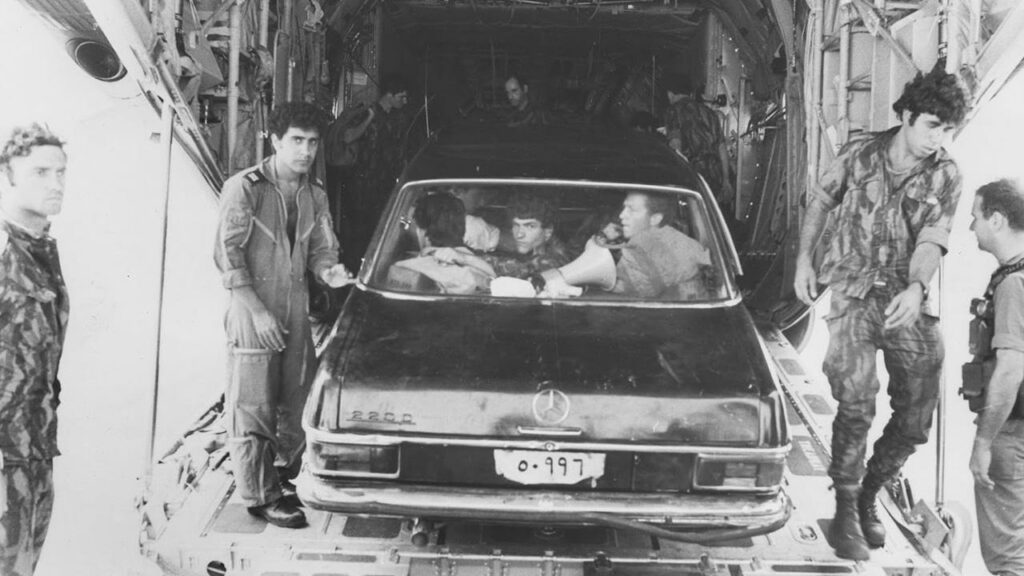
Rabbi Ovadia Yosef and the Halakhot of Hostages: Part II
When Israeli citizens were taken hostage in Entebbe in 1976, Rabbi Ovadia Yosef was asked if hostages could be exchanged for terrorists. What can his towering responsum teach us about the current moment?

Jokes and Justice
We were sitting in our apartment one evening when a Spanish philosopher dropped in ...
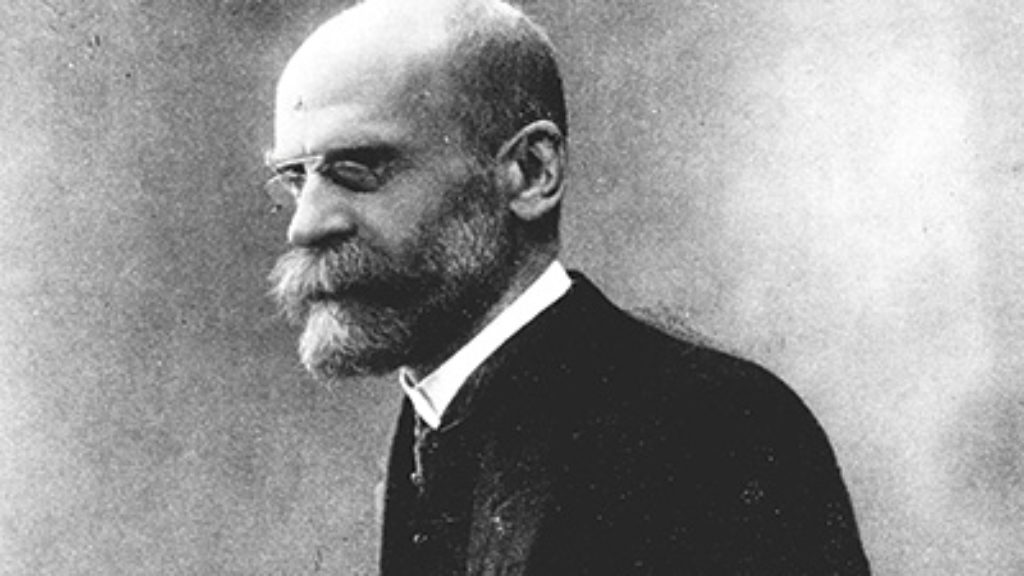
Workday Jews
In their respective books, Chad Alan Goldberg and Eliyahu Stern address the question of whether the Jews are the quintessentially modern people or a people who came to modernity late and with a sudden shock. They reach very different conclusions.
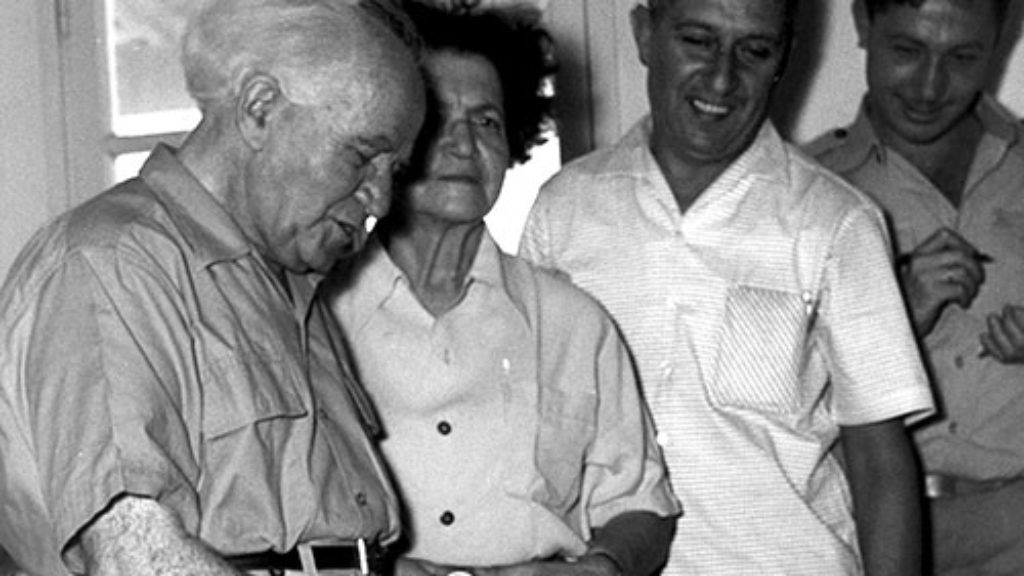
State or Substate?
“Nonstatist” Zionists, as the historian David Myers has dubbed them, have received a lot of attention in recent years. Dmitry Shumsky, a historian at the Hebrew University, is grateful for this scholarship but believes that it has not gone far enough.
Comments
You must log in to comment Log In